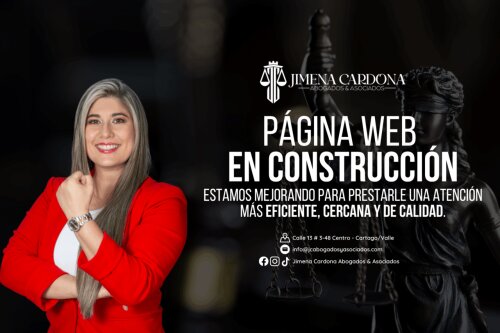Best Marriage Lawyers in Cartago
Share your needs with us, get contacted by law firms.
Free. Takes 2 min.
Free Guide to Hiring a Family Lawyer
List of the best lawyers in Cartago, Colombia
About Marriage Law in Cartago, Colombia
Cartago, a municipality in Valle del Cauca, follows national Colombian law on marriage. Civil status and marriages are processed through notaries and the national civil registry system. When you marry in Cartago, you typically obtain a marriage certificate from the civil registry office and have your marriage registered for legal recognition across Colombia.
Family and marriage rules in Cartago are implemented through the Colombian Constitution, the Civil Code, and related statutes. Local clerks and notaries in Cartago work with the Registraduría Nacional del Estado Civil to ensure your marriage record is properly filed and accessible for future procedures, such as benefits, pensions, and parental rights.
Understanding the core framework helps you plan ahead, especially if you own property in Cartago or have children with your partner. This guide explains practical steps, typical costs, and common issues that arise in Cartago when forming or ending a marriage.
Official guidance indicates that marriages in Colombia are registered with civil registry offices and that certificates can be requested through the Registraduría network. This applies to marriages performed in Cartago as well as elsewhere in Valle del Cauca.
Registraduría Nacional del Estado Civil
Key resources for residents of Cartago include the national notarial registry and the government portal for civil status services. For up-to-date procedures and forms, refer to the official government sites listed in the Additional Resources section.
Sources: Registraduría Nacional del Estado Civil, MinJusticia, and official statistics portals provide the statutory framework and procedural guidance for marriage in Cartago.
Why You May Need a Lawyer
- You plan the matrimonial regime and asset protection in Cartago. If you want to choose between community property and separation of assets, a lawyer can draft the prenuptial agreement and ensure it is registered correctly with the local notary and civil registry.
- You are ending a marriage and need custody or division of assets. In Cartago, divorce filings, child custody, and property partition require precise filings and court or registry steps to avoid delays or misregistrations.
- You or your partner are in a de facto union (unión de hecho) and seek formal recognition. A lawyer helps convert a de facto union into formal civil recognition or address property and social benefits properly.
- You have a marriage established abroad and need Colombian recognition. An attorney can verify foreign documents, obtain apostilles, and register the marriage in Cartago for local effects.
- You face disputes over paternity, child support, or alimony after marriage. Legal counsel helps you navigate Colombian family law and enforcement options in Cartago courts or registries.
- You want to update or correct marital records after a life event. An attorney can handle name changes, address updates, or corrections with the civil registry and notaries.
Local Laws Overview
The core framework for marriage in Cartago is national law, applied locally through Cartago’s notaries and the Registraduría's civil registry. The Constitution and Civil Code establish marriage as a legally binding contract with attendant duties and protections for spouses and children.
Constitutional basis: The Colombian Constitution protects family life and equal rights for all spouses, and it provides a framework for civil status, marriage, and parental rights that applies in Cartago as elsewhere in the country. This framework is the starting point for all procedural rules in Cartago and across Colombia.
Civil framework: The Código Civil Colombiano remains the central body of marriage law, covering capacity, consent, formalities, and the effects of marriage on property and family relations. It governs how marriages are celebrated, recorded, and dissolved in Cartago.
Uniones de hecho: The 1990 law on de facto unions, Ley 54 de 1990, affects how couples living together without formal marriage can obtain legal recognition and rights. It has shaped how registries address cohabitation, property, and legal responsibilities in Cartago.
Recent developments include ongoing jurisprudence and administrative updates that improve access to registry services and clarify recognition of same-sex marriages within Colombia. For procedural details in Cartago, rely on official guidance from the Registraduría and MinJusticia.
Important note: Always verify the most current forms and steps with local notaries in Cartago and the Registraduría, since procedures can vary by office and over time.
Frequently Asked Questions
What is the first step to get married in Cartago?
Meet the basic requirements, choose the venue, and contact a local notary or civil registry to start filings and schedule a ceremony.
What is required to marry in Cartago?
You typically need valid identification, proof of legal capacity to marry, and possibly birth certificates. Requirements vary by office and whether one or both partners are Colombian citizens.
How much does a marriage certificate cost in Cartago?
Costs vary by office and whether you request an extra copy or expedited service. Check the notary's fee schedule and the Registraduría website for current rates.
How long does it take to complete a marriage registration?
Registration can take from a few days to several weeks after the ceremony, depending on office workloads and completeness of documents.
Do I need a lawyer to get married in Cartago?
No, you do not need a lawyer to marry, but a solicitor can help with documents, prenup preparation, and complex issues such as property regimes or international recognition.
Is same-sex marriage recognized in Cartago?
Yes, same-sex marriages are recognized under Colombian law and are processed through the same civil registry channels as any other marriage.
What is a prenuptial agreement in Colombia?
A prenup is a contract that defines property regimes and financial arrangements during marriage. An attorney can draft and file it with the notary.
How do I convert a de facto union to a formal marriage in Cartago?
A lawyer can advise on the legal steps, including filing appropriate petitions or registrations with the registry and ensuring rights to property and social benefits are preserved.
What documents prove you are single or divorced for marriage filings?
Certified copies of birth certificates, previous marriage or divorce decrees, and valid identity documents are typically required for both parties.
How long does a divorce take in Cartago?
Divorce timelines vary, but uncontested divorces may settle within a few months, while contested cases can extend to a year or more.
Can I obtain a copy of my marriage record online?
Many records can be requested through the Registraduría's online services, but some offices may require in-person visits.
Should I hire a lawyer for child custody disputes after marriage?
Yes, an attorney helps you understand local procedures, prepare evidence, and represent your interests in court or mediation in Cartago.
Additional Resources
- Registraduría Nacional del Estado Civil - Official body that registers marriages, issues marriage certificates, and maintains civil registry records. Functions include processing civil status events and ensuring records are accessible for future legal needs. registraduria.gov.co
- Ministerio de Justicia y del Derecho - National ministry that provides guidelines on marriage, family law, and civil registry processes. It issues regulatory updates and policy guidance relevant toCartago residents. minjusticia.gov.co
- DANE - National statistics office offering data on marriage rates and family demographics in Colombia, useful for planning and research. dane.gov.co
Next Steps
- Identify your goal: formal marriage, recognition of a de facto union, or property regime planning.
- Consult a local abogado (solicitor) in Cartago to review documents and advise on required steps.
- Gather documents: valid ID, birth certificates, prior marriage or divorce decrees if applicable, and any international documents.
- Choose the proper registry path: notary for the ceremony and civil registry for the record. Confirm fees and timelines with the local offices.
- Draft any agreements or prenups with your lawyer and file them with the appropriate notary for registration.
- Submit all documents to the registry or notary and schedule the ceremony or registration appointment.
- Follow up on confirmation of registration and obtain certified copies of your marriage certificate for future needs.
Lawzana helps you find the best lawyers and law firms in Cartago through a curated and pre-screened list of qualified legal professionals. Our platform offers rankings and detailed profiles of attorneys and law firms, allowing you to compare based on practice areas, including Marriage, experience, and client feedback.
Each profile includes a description of the firm's areas of practice, client reviews, team members and partners, year of establishment, spoken languages, office locations, contact information, social media presence, and any published articles or resources. Most firms on our platform speak English and are experienced in both local and international legal matters.
Get a quote from top-rated law firms in Cartago, Colombia — quickly, securely, and without unnecessary hassle.
Disclaimer:
The information provided on this page is for general informational purposes only and does not constitute legal advice. While we strive to ensure the accuracy and relevance of the content, legal information may change over time, and interpretations of the law can vary. You should always consult with a qualified legal professional for advice specific to your situation.
We disclaim all liability for actions taken or not taken based on the content of this page. If you believe any information is incorrect or outdated, please contact us, and we will review and update it where appropriate.









